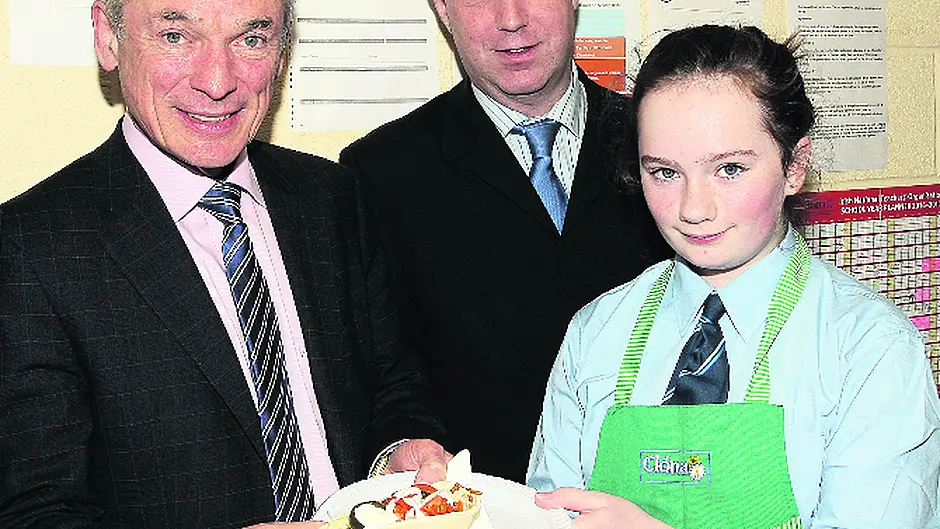Aisling Meath visits a wonderful educational resource which has struck a chord with Education Minister Richard Bruton, who recently dropped in to meet staff and pupils
Aisling Meath visits a wonderful educational resource which has struck a chord with Education Minister Richard Bruton, who recently dropped in to meet staff and pupils
Education is not the filling of a bucket but the lighting of a fire
– WB Yeats, poet and dyslexic genius.
NESTLED in the picturesque countryside with a view sweeping down to Clonakilty bay you will find a little school, Scoil Dhairbhre.
Typical in size to many rural schools found all over Ireland, it provides a holistic approach to education, working within mainstream parameters.
It has 67 pupils and a full time staff of six. Blathnaid Breslin is principal and resource teacher and is aided by Siobhan Courtney, acting deputy principal and senior class teacher; Yvonne Walsh, learning support teacher; June Harrington, middle class teacher; Maeve Beechinor, junoir room teacher and Liz O’Regan, who is a special needs teacher.
The level of satisfaction with the school, among parents, recently filtered through to the Minister of Education and Skills Richard Bruton. Through a personal contact, Minister Bruton decided to visit the West Cork school to see for himself how one little place can make such a huge difference.
Of course, all parents aspire to providing an educational environment that will ensure their children’s school days are happy and carefree. But there are particular challenges faced by parents whose children have learning difficulties. The first and most obvious one is inclusion, and they must also ensure that the child’s confidence levels do not plummet in the midst of feeling different or awkward or ‘less than’. This is where the relationship with the school is of vital importance.
‘Having spent time in various learning support and resource positions prior to becoming principal, I began to realise that children with needs very quickly become conscious of the fact they are being withdrawn from class on an individual basis. They are self-conscious because of their difficulties and also because of going to the support teacher,’ said Blathnaid.
‘We use our support time to provide as much in class as possible. This is reflected in how we interpret the recommendations of educational psychologists and occupational therapists to assist children with specific needs. For example, a child with a diagnosis of dyspraxia that impacts on their ability to plan and organise, and also has fine gross motor deficits, may have an occupational therapist’s (OT) recommendations for project work and fine motor activities, like working with play dough.
‘We address these needs by providing cooking opportunities.
The children plan a meal, divide the ingredients, take responsibility for bringing them to school on the correct day. Then they allocate jobs – chop, fry, cook and serve it to their class or teachers.
We even had a pop-up restaurant for charity a few years ago. This kind of activity is both effective and practical. The children work together, experience success and learn a useful and worthwhile skill. They enjoy coming out with their peers, building relationships, and seeing beyond their difficulties,’ she explained.
Linda Coyle is a parent whose son Pete is in second class. He is eight years old has dyspraxia – which also affects Harry Potter star Daniel Radcliffe.
‘I love maths and doing lots of projects. I get to do OT exercises in groups. I love doing things on the exercise balls. They are able to help more than one person at a time. You’re allowed to have devices for typing and stuff if you need it. I think the teachers are doing a great job,’ he told The Southern Star.
‘Its been hugely supportive to be listened to by the school,’ says his mum Linda. ‘Pete’s education is very much a partnership between us.’
‘We work closely with the parents to address any difficulties as they arise,’ says Blathnaid. ‘Homework may become an issue for a period so we may reduce the amount or put a time limit on it for a while. We look to our parents to support and reinforce what we are doing and we offer them the same support in return. It is vitally important that parents know they can speak to the teacher or send a note.’
Blathnaid, who says the school accepts enrolments for all classes on a rolling basis, adds that parents are an integral part of school life and they have been wonderfully positive and supportive and always rally when needed.
‘We are not a special school, nor do we have a special education unit,’ she says.
‘We are a mainstream school, which has developed a holistic and inclusive approach to how we educate our children with difficulties. We tailor their extra supports to meet their needs by utilizing their interests to help them learn. Why not use Lego to address fine motor deficit? Create a drama group with peers to teach a child about social situations. Challenge the gifted child in third class by grouping them with those struggling in the upper classes?’
Stress is a big worry for many of today’s parents and giving children tools to deal with it from an early age is a pretty insightful move.
The pupils at Scoil Dhairbhre are also being provided with a one-hour per week yoga session facilitated by Kate Finn.
‘I was recently commending Blathnaid on how wonderful I think the children and the school are,’ she said. ‘I went to an Educate Together primary school and I get a similar feeling of openness and warmth when I come to Darrara. I think the teacher/student relationship here is down to earth and sincere. The children interact
together, they are marvellous.’
It seems that positive energy radiates around the school and is reflected in a piece written by Yvonne Walsh, Learning Support teacher in the school newsletter that reads: ‘Don’t ever underestimate the power of praise and a kind word. We, as adults, can also learn a lot by being encouraged to learn simple lessons from our children. Live as they live – with joy, love, energy, positivity, forgiveness and kindness.’








